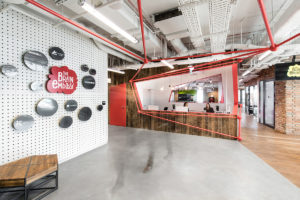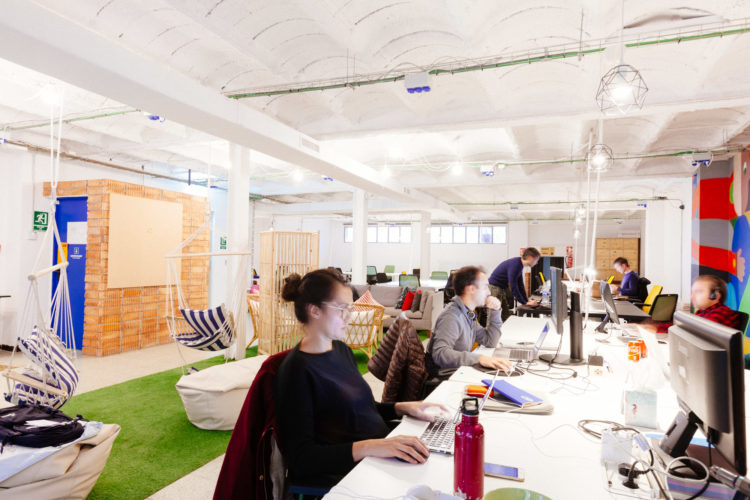The Coworking Europe Conference 2019 is heading to Warsaw on November 13-15th for its 10th edition. In order to get to know the local ecosystem, we have interviewed Konrad Szaruga and Natalia Kuliberda, both real estate experts who have shared with us their experience, thoughts and insights about the polish market.
Can you introduce yourself and tell us about your past and current involvement in the coworking fields?

Konrad Szaruga: “I have 10 years experience in commercial real estate market from Developer followed by 5 years of experience in advisory firm – CBRE representing Tenants and Landlords to coworking which started in managing NewWork Offices in Poland followed by Business Development for Business.Link.
NewWork Offices is Hungarian based coworking network, available in Central Eastern Europe. In 2017, I was responsible for opening Polish branch of the organization, and managing it first coworking site in Poland – NewWork Wilanów in Warsaw with area of 3200 sqm.

After that I’ve joined Business Link in the beginning of 2018 and was responsible for setting up new strategy for the brand and acquiring clients for newest developments of the brand. Business.Link is the largest polish coworking operator who grew up rapidly after joint venture with the real estate company Skanska.”
Natalia Kuliberda: “During over 7 years of experience in real estate industry, I went through the full spectrum of business functions, including but not limited to: strategic planning, sales & operations processes. Thanks to open-minded and agile approach, as well as strong analytical skills, I successfully managed the leasing and asset tasks in 110 000 sqm. Specialize in solving problems and creating new opportunities for business partners. Experienced in coworking & flexible office solutions.”
Poland was not the first country to climb into the coworking train. How do you explain it?
There are few reasons to explain this. Boom in coworking in the world was mainly caused by 2008 crisis – afterward companies were afraid of future and long lease obligations, typical for major markets (London, Paris, NY, LA…). In Poland as one of the few countries in EU, the crisis was barely slow down so we have missed that driver.

The coworking boom started in Poland ca. 3 years ago with introducing By Adgar Brain Embassy who was the first modern style coworking spaces directed to freelancers, small and medium companies as well as corporations. Together with two modern BusinessLink locations in Warsaw. This was an answer for two new needs which was born in our market: project working and competition for talent pool.
Now we see that these two reasons are the main drivers to rapid growth of coworking market in Poland.
Nowadays, Warsaw is the city in Europe with the highest level of investment in corporate real estate. Are property owner keener to embrace the coworking model?
In our opinion (in high level) situation in the commercial real estate market and recent coworking boom is best to compare to entrance Uber in the passenger transport market. After few years, Uber didn’t displace taxi’s, car sharing nor buses (and please remember that Polish market is not regulating Uber). This is a response to people’s needs and how the commute.
Same with coworking – this is supplement / feeling a void in commercial real estate market.
The competition is becoming fiercer in Warsaw, with big international coworking names opening up big spaces. How do the existing players react?

This is the question we will know the answer only at the end of this year and next year.
WeWork entered market and opened first premises in December 2018. Three months later Regus and Regus Spaces, Solutions.rent, NewWork and Wework itself opened 6 more locations in the city center of Warsaw itself! The paste of Market growth is unparalleled. WeWork as the one with the biggest appetite. It will for sure change the market. To what extend ? It is hard to tell.
Do you see something specific to the Warsaw coworking scene that you have not seen in other European major cities?
We think that pipeline for new investment compared with the market itself in 2018-2020 shows biggest dynamic and fastest growth (relative to the market).
The biggest players are Regus (the oldest one), WeWork and NewWork who will cope with very strong local players like CitySpace, Business.Link and Brain Embassy. It’s worth to mention that the local players showing the appetite to become market leaders in Warsaw, Poland or even in the whole EU are backed-up by major real estate developers (Echo, Skanska and Adgar respectively).
It is worth to mention that the local players showing the appetite to become market leaders in Warsaw, Poland or even in the whole EU, are backed-up by major real estate developers (Echo, Skanska and Adgar respectively).
Are foreign companies located in Warsaw more open to join a coworking space than Polish organisations?
Yes and this is not only for foreign companies. Polish entities are also looking for new spaces.
For both, the main drivers (mentioned earlier) are project based work and the war for talents. The modern coworking spaces with very low entry threshold compared with high quality office spaces are gaining.
How difficult is it to build a community in a booming city such as Warsaw, with so much things moving around?

Community Management will be the name of the game in 2019/2020. Because of the young market and the shortage of experienced community managers, this is what we expect to see developing rapidly. With that fast pace of growth and huge competition, simple “event calendar overload” is not enough. Each provider has its own approach and we see that other players wants to distinguish itself, like i.e. Nest coworking who is inviting parents with kids.
Community Management will be the name of the game in 2019/2020. With that fast pace of growth and huge competition, simple “event calendar overload” is not enough.
How important is the community, according to you?
For every coworking who would like to anchor the clients and hold them there are three main unique selling points: location, price vs quality, community. You can discuss which one is the most important. However, at the end of the day, community is the only selling points which you can shape by yourself and distinguish from the competitors, and tie the client. So looking from this perspective this is about to live or to die for every coworking space.
At the end of the day, community is the only selling points which you can shape by yourself and distinguish from the competitors
How about coworking in the other Polish cities?

Poland it is not only Warsaw and we have few very strong and important local cities like Kraków, Wrocław Poznań, Tri-City, Silesia with fiercely competitive Lublin and Białystok in the east of the country and central located Łódź which was in the shadow of Warsaw for a long time and now getting bigger and bigger attention.
Local markets growth is slightly slower than in Warsaw but the rapid growth is ahead of us and they should boom in next 3 years.
Where do you see the coworking market in Warsaw in 2 years and 5 years time?
We do believe that the future of market is ca. 15-20% of modern office stock serving as coworking space. The question is how fast we will reach that goal. Is it 5 years from now? – we will see. For sure, in the next two years, we will see rapid growth and interesting fight between operators. Nevertheless, as the product is still barely known by the market, there should ultimately be plenty of room for everyone.








Recent Comments